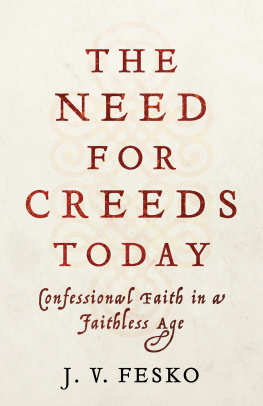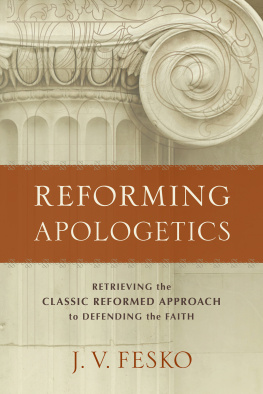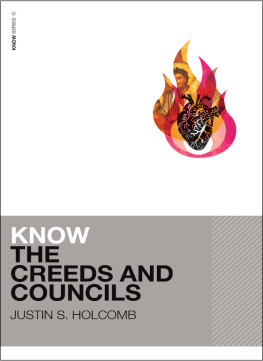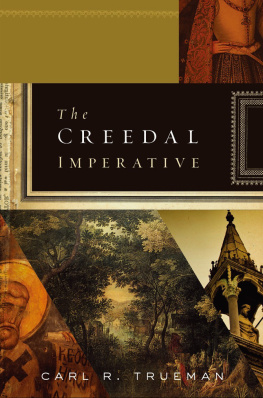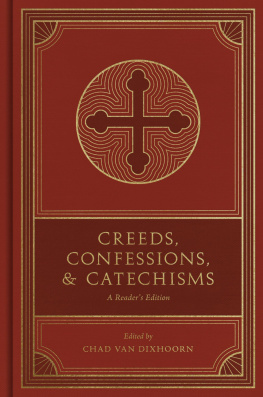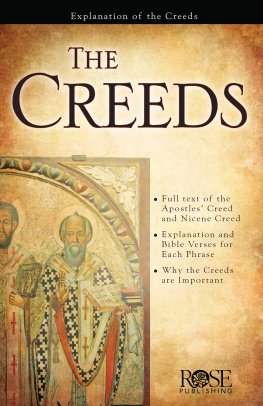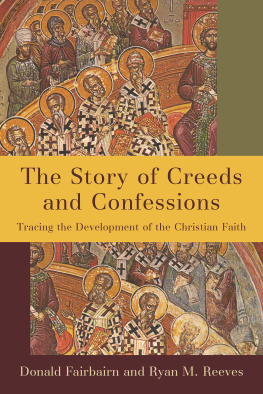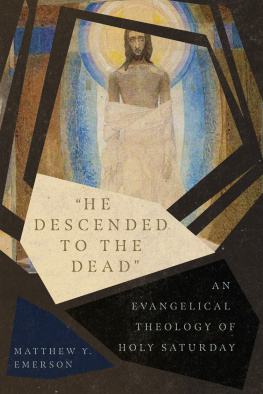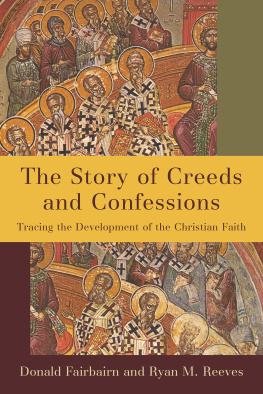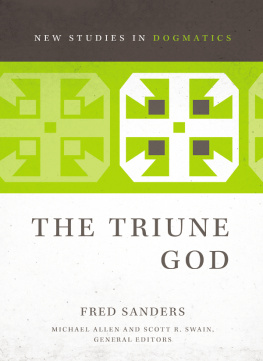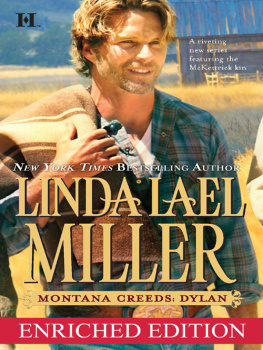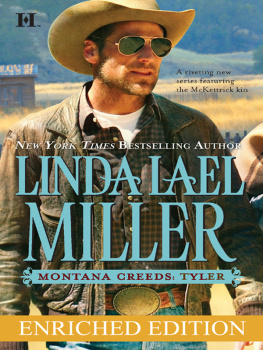J. V. Fesko - The Need for Creeds Today: Confessional Faith in a Faithless Age
Here you can read online J. V. Fesko - The Need for Creeds Today: Confessional Faith in a Faithless Age full text of the book (entire story) in english for free. Download pdf and epub, get meaning, cover and reviews about this ebook. year: 2020, publisher: Baker Publishing Group, genre: Religion. Description of the work, (preface) as well as reviews are available. Best literature library LitArk.com created for fans of good reading and offers a wide selection of genres:
Romance novel
Science fiction
Adventure
Detective
Science
History
Home and family
Prose
Art
Politics
Computer
Non-fiction
Religion
Business
Children
Humor
Choose a favorite category and find really read worthwhile books. Enjoy immersion in the world of imagination, feel the emotions of the characters or learn something new for yourself, make an fascinating discovery.
The Need for Creeds Today: Confessional Faith in a Faithless Age: summary, description and annotation
We offer to read an annotation, description, summary or preface (depends on what the author of the book "The Need for Creeds Today: Confessional Faith in a Faithless Age" wrote himself). If you haven't found the necessary information about the book — write in the comments, we will try to find it.
J. V. Fesko: author's other books
Who wrote The Need for Creeds Today: Confessional Faith in a Faithless Age? Find out the surname, the name of the author of the book and a list of all author's works by series.
The Need for Creeds Today: Confessional Faith in a Faithless Age — read online for free the complete book (whole text) full work
Below is the text of the book, divided by pages. System saving the place of the last page read, allows you to conveniently read the book "The Need for Creeds Today: Confessional Faith in a Faithless Age" online for free, without having to search again every time where you left off. Put a bookmark, and you can go to the page where you finished reading at any time.
Font size:
Interval:
Bookmark:
Acknowledgments
Sometimes a speaker develops material, creates notes, and then builds an outline for a lecture. But whenever I can, I write essays (or chapters) from which I then create lecture outlines. I am grateful for the invitations from the Texas Area Association of Reformed Baptist Churches (TAARBC) and the Southern California Reformed Baptist Pastors Conference (SCRBPC) to lecture on confessions. Their invitations prompted me to write this book and afforded me the occasion to reflect more deeply on the topic of confessions as I investigated and documented their biblical warrant, rich Reformed heritage, ideological foes, and great benefit to the church.
I am grateful to Dave Nelson and the publishing team at Baker. Thank you for supporting this project and for your tremendous care and professionalism in seeing this book through to publication. Thanks to Alex DeMarco for all of his careful editorial suggestions and corrections.
I am also grateful to the board, faculty, and staff at Reformed Theological Seminary, Jackson, Mississippi. I am privileged to be part of an institution that steadfastly believes and promotes the historic Reformed faith, which is contained in the Scriptures and summarized in our confessions and catechisms.
And I also want to say thank you to my family. Your support, love, and kindness throughout the years enable and encourage me to continue to read, research, and write.
When I was a recent college graduate, I sensed a call on my life to serve in ordained ministry. At the time, I was a theological neophyte and was looking for good books to read. One of my friends who was working on his PhD in church history started taking me through Calvins Institutes . This was definitely a huge uphill climb; my brain ached with each step up the slopes of Calvins two-volume magnum opus. I had to keep a notecard handy with one-word synonyms for many of the words I encountered. Also at this time, another good friend of mine was continually mentioning and quoting another theologian when he taught the Bible to my college and career Sunday school class.
My parents noted the name and bought me several of his books for Christmas. As I read this theologian, I could tell that deep currents of thought ran through the pages of his books, but they were still accessible. The books poured forth a steady stream of surging water, but I could get close enough to the waters edge to take regular sips. He made complex concepts easier to understand, and I soaked in vast reservoirs of theological knowledge. I soon found myself attending his conferences and buying as many of his audio cassette sermons and lectures as I could. Even though I had a hefty reading schedule in seminary, I found time to read this theologians books. I worked in the evenings as a janitor in the library and would listen to his tapes three to four hours a night, five days a week. With his more advanced lectures, I had to make frequent stops by the colossal Oxford English Dictionary to look up the polysyllabic word grenades that he would throw into his lectures. But the more I listened, the more I liked, the more I learned, and the more I came to love the Reformed faith. God used this theologian to produce a crisis in me that caused me to fully embrace the Reformed faith and to join the Orthodox Presbyterian Church.
December 14, 2017, was a bittersweet day. It was the day that this beloved theologian, pastor, teacher, and friend, R. C. Sproul, died and met his Maker face-to-face. I miss him. Through his books and tapes, he was my theological mentor. Although Dr. Sprouls death leaves a hole in modern-day theology, his absence should remind us that Christ is faithful. The Lord continues to build his church, and the gates of hell will never prevail against it. Christ continues to send his gifts to his church: faithful ministers of the gospel to teach and preach the message of salvation. I give thanks to Christ for giving us so many ministers over the agesfaithful servants who regularly feed us the manna from heaven. For these reasons, I dedicate this book on confessions of faith to the memory of R. C. Sproul. May God raise up scores of zealous ministers to herald the Reformed faith.
ONE

Biblical Arguments for Confessions
Introduction
As democracy spread throughout the burgeoning United States of America in the eighteenth and nineteenth centuries, ideals of freedom and Christianity mingled and gave birth to a decidedly American form of religion. Barton W. Stone (17721844), Thomas Campbell (17631845), and Thomass son Alexander Campbell (17881866) were leaders of the Restoration movement (also known as the Stone-Campbell movement), which wanted to peel back the layers of accumulated dogma and return Christianity to what they believed was its purest, most primitive form. The movement leaders referred to their break with the Presbyterian church as their declaration of independence. And Alexander Campbell encouraged his followers to commemorate July 4, 1776, as a day equal to the Jewish Passover. That is to say, Stone and the Campbells created a populist movement that rode on the winds of American democracy and freedom. Instead of confessions of faith, the Stone-Campbell movement trumpeted the motto no creed but the Bible. It was clear that many in the new world had little space for confessional, old-world faith.
The anti-creedal movement grew as those churches that embraced theological democracy outpaced their confessional competitors. In 1776, Congregationalist and Presbyterian churches were dominant, holding almost 40 percent of the American churchgoing population. But by 1850, about 54 percent of American churchgoers were attending Baptist and Methodist churches, with Presbyterian and Congregationalist churches together claiming only about 15 percent of the pie. The sentiment that creeds and confessions were unbiblical, and thus to be rejected, thrived in the nascent nation. Considering how popular the no creed but the Bible mentality was and continues to be, we must ask, What does the Bible have to say about confessions?
At first blush, such a question might seem absurd. Some might ask, What does the Spirit-inspired Bible have to do with these all-too-human documents? But closer examination shows that there is biblical evidence to support the claim that confessions of faith are both biblical and necessary. To prove this claim, this chapter surveys eight biblical texts: the institution of the Passover liturgy (Exod. 13:1415), the giving of the Shema (Deut. 6:46), the apostle Pauls five trustworthy sayings (1 Tim. 1:15; 3:1; 4:79; 2 Tim. 2:1113; Titus 3:48), and Judes exhortation to contend for the faith once delivered to the saints (Jude 3). Each of these texts captures the idea that God expects his people to take his authoritative revelation, reflect on and study it, restate it in their own words, and pass it down to future generations. The Bible mandates the creation and maintenance of a biblically faithful confessional and catechetical tradition. After surveying the eight texts, the chapter presents an analysis, exploring how the Bible warrants confessions and catechesis, provides protections against dead confessionalism, and reveals an indissoluble link between confession and piety. It then concludes with summary observations about the need for biblically faithful confessions of faith.
Instruct Future Generations (Exod. 13:1415)
Gods revelation comes in several different forms, but it is more than a divine memorial, an echo of Gods voice. Israel is supposed to record Gods Word and reflect on it for generations to come. The first time God commands Israel to perform this catechetical task is when he gives instructions for the celebration of the Passover. The Israelites are supposed to reenact, remember, and rationalize the Passover:
Next pageFont size:
Interval:
Bookmark:
Similar books «The Need for Creeds Today: Confessional Faith in a Faithless Age»
Look at similar books to The Need for Creeds Today: Confessional Faith in a Faithless Age. We have selected literature similar in name and meaning in the hope of providing readers with more options to find new, interesting, not yet read works.
Discussion, reviews of the book The Need for Creeds Today: Confessional Faith in a Faithless Age and just readers' own opinions. Leave your comments, write what you think about the work, its meaning or the main characters. Specify what exactly you liked and what you didn't like, and why you think so.

